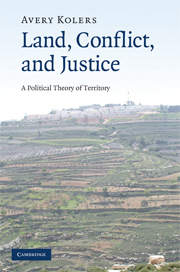Book contents
- Frontmatter
- Contents
- List of tables
- List of figures
- Foreword and acknowledgments
- Introduction
- 1 Everything you always wanted to know about taking other people's land (but were afraid to ask)
- 2 Land and territory in political theory
- 3 Groundwork
- 4 Plenitude
- 5 Territorial disputes
- 6 Implementation
- Works cited
- Index
1 - Everything you always wanted to know about taking other people's land (but were afraid to ask)
Published online by Cambridge University Press: 07 August 2009
- Frontmatter
- Contents
- List of tables
- List of figures
- Foreword and acknowledgments
- Introduction
- 1 Everything you always wanted to know about taking other people's land (but were afraid to ask)
- 2 Land and territory in political theory
- 3 Groundwork
- 4 Plenitude
- 5 Territorial disputes
- 6 Implementation
- Works cited
- Index
Summary
Land is valuable in three basic ways. When stated, they are obvious, but they are so rarely stated in political theory as to require reaffirmation. First, we live on land – we, our homes, our belongings, and things we build individually and collectively, take up space. Hence the physical extension of terra firma is a good whose distribution matters to everyone. Second, land is composed of resources that we need in order to survive, prosper, and express ourselves; literally, the land constitutes both our physical bodies and virtually every material good we can find or fashion. Hence secure access to good land, land we can use to do the things we care about, is essential to our capacity to make our way in the world. Third, land and its properties – its location, its material composition, who or what lives on it – are essential to a vast array of world systems, such as nitrogen and carbon cycles, water purification and storage, ecosystems, and the production of oxygen, without which we would not exist. All the value of territory is built on these three foundations.
These three foundations have implications both for why anyone has a special interest in a particular place, and for how the world's land ought to be distributed among all potential claimants.
- Type
- Chapter
- Information
- Land, Conflict, and JusticeA Political Theory of Territory, pp. 8 - 31Publisher: Cambridge University PressPrint publication year: 2009



